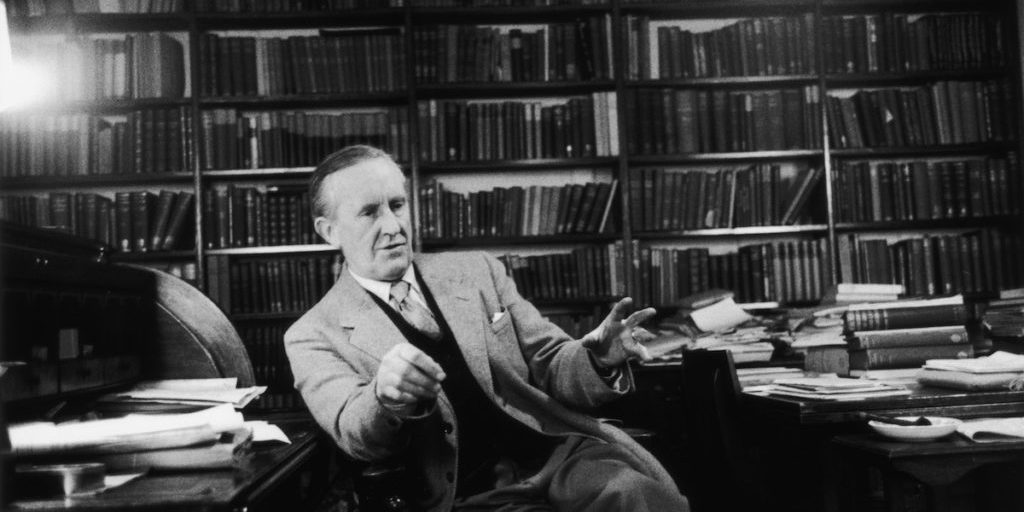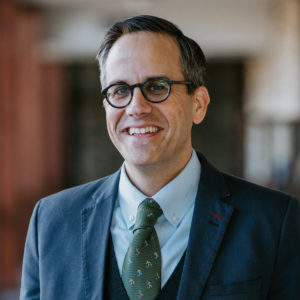
Friendship to the Nth Power: Tolkien, a movie review
The new issue of Credo Magazine focuses on The Aseity of God. The following is an excerpt from Jason Duesing’s column review, Friendship to the Nth Power: Tolkien, a movie review. Jason Duesing serves as the academic Provost and Associate Professor of Historical Theology at Midwestern Baptist Theological Seminary. He came to MBTS after serving for more than a decade on the administrative leadership team and faculty at Southwestern Baptist Theological Seminary in Fort Worth, Texas. Duesing earned his Ph.D. in Historical Theology and Baptist Studies from Southwestern Seminary in 2008. He is the author of several books including Mere Hope, Henry Jessey, First Freedom, and Seven Summits in Church History.
“We are your friends, Frodo.” -J. R. R. Tolkien [1]
“Christ, who said to the disciples, ‘Ye have not chosen me, but I have chosen you,’ can truly say to every group of Christian friends ‘You have not chosen one another but I have chosen you for one another.’” -C. S. Lewis [2]
The influence of The Great War on J. R. R. Tolkien and, to a degree, his later mythopoeic work is well established.[3] Tolkien, himself, relayed to his son Christopher, when the latter was serving in World War II, that it was the first war that generated early parts of Middle Earth in his imagination and that he wrote “by candle light in bell-tents, even some down in dugouts under shell fire.”[4] Indeed, his later hobbit companion, Sam Gamgee, was a reflection of the “batmen I knew in the 1914 war,”[5] and his experience at the Battle of Somme shaped his description of the Dead Marshes in The Two Towers.[6]

Thus, what is remarkable about the new biopic, Tolkien (2019), is not the foreshadowing of Middle Earth from the trenches of France, even though creatively done, but rather the friendships that formed Tolkien and how Tolkien, too, was a friend. It is the people, not the myth, that make this film worthwhile.
While the film shuffles some of the details and order of events, Tolkien’s meeting his future wife, Edith Bratt, in 1908 marked the start of his most important friendship.[7] The two teenage orphans would start spending more time together in 1909, often in teashop balconies where “they would sit and throw sugar-lumps into the hats of passers-by.”[8] Soon they declared their love for one another and although they kept their feelings in secret, the relationship had a negative effect on Tolkien’s qualifying examinations for Oxford. This led to his guardian, Father Francis, to relocate Tolkien and forbade him to communicate with her until he turned 21.
The Fellowship of the TCBS
The Tea Club and Barrovian Society did not form until the summer of 1911, when Tolkien was 19 and serving as the school librarian at King Edward’s in Birmingham. Nevertheless, his friendships with Christopher Wiseman, Rob Gilson, and Geoffrey Smith deepened as they encouraged each other in the pursuit of art, and to the admiration of many. One classmate later wrote, “As a boy you could not imagine how I looked up to you and admired and envied the wit of that select coterie.”[9]
Tolkien’s TCBS fellowship occupied his energy during the years he was banned from Edith and would continue with him to university studies at Oxford. In those early college years, Tolkien would pursue social events over his studies, as marked by one occasion when he and Geoffrey Smith “captured a bus and drove it up to Cornmarket.”[10] He would say later he “misspent a good deal of my first year”[11] in part, because of missing Edith, but also due to his growing dissatisfaction of studying the classics.[12]
Tolkien had a lifelong fascination with language. By the time he was 16, a friend had sold him a copy of Joseph Wright’s Primer of the Gothic Language.[13] Upon reading it, Tolkien remarked that he had an experience similar to the poet Keats when Keats read the works of Homer in English for the first time and captured his feelings in the sonnet, “On First Looking into Chapman’s Homer” (1816). Tolkien expressed that “The contemplation of the vocabulary in A Primer of the Gothic Language was enough: a sensation at least as full of delight as first looking into Chapman’s Homer. Though I did not write a sonnet about it. I tried to invent Gothic words.”[14] His invention of languages commenced and a love for the study of words, philology, developed.[15]
On January 3, 1913, Tolkien turned 21 and just after midnight he wrote a letter to Edith having honored Father Francis’s three-year stipulation to the very hour. In the letter he declared his love and desire to marry Edith, but her reply conveyed that she was already engaged, though she left room for Tolkien to see he had an opportunity. Rather than wallow, Tolkien boarded a train on January 8 and when he arrived, Edith met him. After a day of walking and talking, Edith agreed to cancel her engagement and marry him.[16]
At the time he tired of classics and was reunited with Edith, Tolkien had to sit for his mid-degree exams. He scored high enough to continue in his studies thanks to a high mark on a paper written on a topic related to philology. This led him to see a path toward graduation that allowed more focused study on language, majoring in English Literature. By this time his Classics Tutor, Lewis Farnell, was the administrator of his college and, thus, was able to facilitate the change and keep Tolkien’s scholarship. Perhaps the greatest blessing of this change arrived when Tolkien now had the opportunity to study formally with Joseph Wright, leading philologist and Tolkien’s academic hero.[17] It is the people, not the myth, that make this film worthwhile Click To Tweet
Read Dr. Jason Duesing’s entire column review in the new issue of Credo Magazine: The Aseity of God.
Endnotes
[1] J. R. R. Tolkien, Chapter 5, “A Conspiracy Unmasked,” in The Fellowship of the Ring.
[2] C. S. Lewis, “Friendship,” in The Four Loves (1960).
[3] See John Garth, Tolkien and the Great War: The Threshold of Middle-earth (HarperCollins, 2003). See also Humphrey Carpenter, J. R. R. Tolkien: A Biography (HarperCollins, 1977, 2000), and idem and Christopher Tolkien, The Letters of J. R. R. Tolkien (Houghton Mifflin, 1981, 2013).
[4] To Christopher Tolkien, May 6, 1944, Letters, 78.
[5] Biography, 89.
[6] To Professor L.W. Forster, December 30, 1960, Letters, 302. See also Martin Gilbert, “What Tolkien taught me about the Battle of the Somme,” FT Magazine 29/30 (July 2006).
[7] The inaccuracies are likely part of the reason why the Tolkien Estate did not endorse or authorize the film. See Alison Flood, “Tolkien estate disavows forthcoming film staring Nicholas Hoult,” The Guardian, April 23, 2019.
[8] Biography, 47.
[9] To Christopher Wiseman, May 24, 1973, Letters, 429.
[10] Biography, 62.
[11] To Michael Tolkien, March 6-8, 1941, Letters, 53.
[12] “My love for the classics took ten years to recover from lectures on Cicero and Demosthenes,” in “Professor J. R. R. Tolkien Creator of Hobbits and inventor of a new mythology,” The Times, September 3, 1973.
[13] Joseph Wright, A Primer of the Gothic Language (Oxford, 1899); Biography, 45.
[14] “English and Welsh,” in Angles and Britons (University of Wales Press, 1963), 38.
[15] Tolkien did use the phrase “cellar door” as an example of beautiful language, but not until 1955 in his “English and Welsh” lecture later published in Angles and Britons (University of Wales Press, 1963). See Grant Barrett, “Cellar Door,” in The New York Times Magazine, February 11, 2010.
[16] Biography, 69-70.
[17] Garth, Tolkien and the Great War, 29-30.

